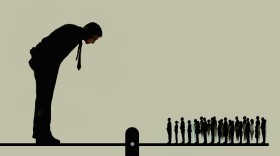
Tara Boyle
Tara Boyle is the supervising producer of NPR's Hidden Brain. In this role, Boyle oversees the production of both the Hidden Brain radio show and podcast, providing editorial guidance and support to host Shankar Vedantam and the shows' producers. Boyle also coordinates Shankar's Hidden Brain segments on Morning Edition and other NPR shows, and oversees collaborations with partners both internal and external to NPR. Previously, Boyle spent a decade at WAMU, the NPR station in Washington, D.C. She has reported for The Boston Globe, and began her career in public radio at WBUR in Boston.
-
This week on the Hidden Brain radio show, we dig into the culture and psychology that determines the foods that make us salivate and the scents that make us squirm.
-
There's a core belief embedded in the story of the United States: the American Dream. The possibility of climbing the economic ladder is central to that dream. This week we speak with Raj Chetty, one of the most influential economists alive today, about the state of economic mobility in the U.S. and whether the notion of the American Dream is still useful. For more information about the research in this episode, visit https://n.pr/2z8cvSs.
-
We all know the downsides of being poor. But what about the downsides of being rich? This week, we explore the psychology of scarcity...and excess.
-
Nearly a quarter century ago, a group of women accused a prominent playwright of sexual misconduct. For the most part, the allegations went nowhere. In 2017, in the midst of the #MeToo movement, more women came forward to accuse the same playwright of misconduct. This time, everyone listened. On this episode — originally broadcast in February 2018 — we explore the story through the lens of social science research and ask, "Why Now?" What has changed in our minds and in our culture so that allegations of sexual harassment and assault are being taken more seriously than they were in the past? A note: This story includes descriptions of sexual harassment and assault. It may not be suitable for all listeners.
-
If you live in a big city, you may have noticed new buildings popping up — a high-rise here, a skyscraper there. The concrete jungles that we've built over the past century have allowed millions of us to live in close proximity, and modern economies to flourish. But what have we given up by moving away from the forest environments in which humans first evolved? This week, we discuss this topic with psychologist Ming Kuo, who has studied the effects of nature for more than 30 years.
-
Have you ever had a job where you had to stop and ask yourself: what am I doing here? If I quit tomorrow, would anyone even notice? This week on Hidden Brain, we talk with anthropologist David Graeber about the rise of what he calls "bullshit jobs," and how these positions affect the people who hold them.
-
There are signs it's getting even harder. In this episode, we explore how long-term relationships have changed over time and whether we might be able to improve marriage by asking less of it.
-
Decades ago, a group of women accused a prominent playwright of sexual misconduct. For the most part, the complaints went nowhere. In 2017, more women came forward. This time, people listened.
-
Francesca Gino studies rebels — people who practice "positive deviance" and achieve incredible feats of imagination. They know how, and when, to break the rules that should be broken. So how can you activate your own inner non-conformist? We kick off this year's You 2.0 series by pondering this question.
-
This week on Hidden Brain's radio show, we tackle a big topic: power. From our conflicted feelings toward the powerful, to the ways we gain and lose power ourselves, and how power can corrupt.
-
How many ads have you encountered today? On this week's radio replay, we discuss the insidiousness of advertising in American media.
-
Violent crimes committed by Muslims are much more likely to be reported as "terrorism." And that has disturbing consequences for the way Muslims are perceived.













